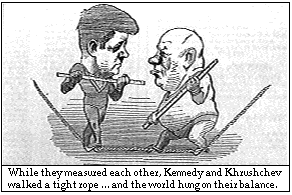... this page is part of the Web Site of George North ...
George North
439-68-5643
HIST 4991
November 7, 1994
Abel, Elie, The Missile Crisis. First edition. J. B. Lippincott
Company, Philadelphia & New York, 1966. 220pp.
An examination of events surrounding the Cuban Missile Crisis is no less
terrifying today then they were in 1962. Reading Elie Abel's book brings
to life two weeks in October, 1962 when the leaders of the world's super
powers were on the brink of nuclear holocaust. With the power to destroy
the world, each nation looked into the nuclear abyss waiting for the other
to blink. Written in journalistic narrative style, this book is important
today because it of the way it recreates events.
Born in Canada in 1920, Able is a naturalized U.S. citizen. He is a graduate
of McGill University with a masters from Columbia University. Able started
his long career as a reporter and correspondent at the Montreal Gazette
in 1941. As foreign correspondent in Berlin, Germany, he worked for the
North American Newspaper Alliance in 1946 and 47. For three years he worked
as United Nations correspondent for the Overseas News Agency. From 1949
to 1961, Able covering Washington, DC as a reporter for the New York Times.
By 1962, Elie Abel worked as London correspondent for the National Broadcasting
Company. The Missile Crisis is his first book, first published
in England with the title Missiles of October . Other works
include: Roots of Involvement: The U.S. in Asia , Norton, 1971;
Special Envoy to Churchill and Stalin , Random House, 1975;
What's News: The Media in American Society , 1981; The
Shattered Bloc: Behind the Upheaval in Eastern Europe , Houghton,
1990. Mr. Able taught at Columbia University, as Cabot Professor of Journalism
and dean of graduate school of journalism, 1969-79.
Footnotes are used to document direct quotes and to provide additional comments.
Aerial photographs (courtesy of U.S. Department of Defense) of Cuba taken
by U2 overflights are included. These are the same photographs shown to
American allies in trying to justify the blockade of Cuba. Also included
is a photograph of what President John F. Kennedy called the "Executive
Committee," fifteen to twenty men, in and out of his administration.
The committee met in secret sessions in the White House Cabinet Room twice
daily during the crisis.
The crisis starting on Sunday, October 14, 1962. On this day, McGeorge Bundy,
the Harvard dean turned Presidential assistant for national security affairs,
said in an ABC news broadcast that "... I don't myself think there
is ... (any) present likelihood that the Cubans ... and the Soviet Government
would, in combination, attempt to install a major offensive capability."
In fifteen chapters, Elie Able relates the relevant events of each of the
next fifteen days. He provides much insight into the harrowing days that
shook the world to its foundations. Using his journalistic style, Abel paints
portraits of the personalities involved in the events and creates mood with
revealing anecdotes and quotations. Since its publication, many works more
analytical than this have appeared, but none could make the events more
real.
I. F. Stone wrote a favorable review of the book with his comments and observations
of the events surrounding the Cuban crisis. It is published in The
New York Review , April 14, 1966. A review by Dan Kurzman in Saturday
Review , March 12, 1966 is also favorable. A review in The
New Republic was unfavorable. In Rise to Globalish ,
Stephen E. Ambrose states "Elie Abel's The Missile Crisis
is a first-rate account by a professional journalist.
How to get the missiles out of Cuba without war? When, if at all, should
the President tell the world about the missiles in Cuba? Should the United
States act alone or in conjunction with the United Nations and , or its
other allies? A military invasion of Cuba would risk 1000's of American
lives, would an air strike suffice? On October 6, less than two weeks earlier,
Vice President Lyndon Johnson had chided the Republicans for advocating
a blockade of Cuba, saying that "Stopping a Russian ship is an act
of war," could a blockade even be considered? How would the Russians
respond to these options? President Kennedy surrounded himself with the
"Executive Committee" to help answer these questions. The fact
is that nearly every man in the room changed his position at least once
some more than once during that first anxious week of brainstorming.
"This is the week when I had better earn my salary," President
Kennedy told Dean Acheson. In their eyeball to eyeball confrontation, Khrushchev
blinked first. The fright it gave Khrushchev and the new sense of confidence
it gave Kennedy were factors in the détente which followed. The look
into the abyss made both men really feel in their bones the need for coexistence.
Elie Able provides an exciting and factual account of the world's first
nuclear confrontation. While he does not attempt an analysis of policy-making
in time of crisis, his book provides absorbing and suspenseful reading.
This is not a book of historical facts. It is a way to (re)live history,
creating an event that lives on in our minds.

In 1962, I was fourteen years old and still invincible. More than my
own fear, I remember the fear I could see in my father. In family meetings
we discussed where to go, what to do if the unthinkable happened. This book
is important because it makes real what is unthinkable. I recommend this
book, especially to those who have no memory of two weeks in October 1962.

